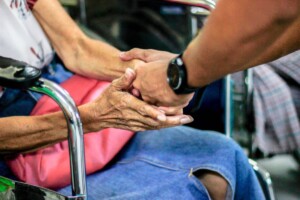Compassion from the Gut
 The Samaritan’s compassion came from his gut. It’s interesting that when the text says he was “moved with compassion,” it means that he was “moved in his bowels” (for the bowels were thought to be the seat of love and pity).
The Samaritan’s compassion came from his gut. It’s interesting that when the text says he was “moved with compassion,” it means that he was “moved in his bowels” (for the bowels were thought to be the seat of love and pity).
Imagine that.
From the parable’s perspective, the Samaritan’s pity, goodwill, and sacrificial care come not from some abstract precept. They come from the embodied, felt sense of compassion for the suffering he encountered. Therefore, his circle of concern expanded on that road years ago because he was attuned to his gut feelings. His gut said: “I see the face of God in the face of my neighbor. Indeed, I see my own countenance. Bone of my bone, flesh of my flesh. Siblings marked by a shared fragility and interdependency.”
Morality is Felt in the Body
Christian morality is no less than an incarnated morality. Christian morality meets us in the fabric of our bodies, nourished by the felt sense of compassion. It speaks the dialect of our guts and bones, the deep knowing of our subterranean. The violation of human bodies is rightfully felt in our bodies. We may call this orthopathos—right feelings.
The Good Samaritan is less an exemplar of some immaculate virtue and more of a revealer of a fundamental truth: our fate is bound to our neighbors’ fate. All of them. Yet how many of us spend our lives trying to sever those sinews? With each snip, each calloused turn from the anguish around us, we arrogantly ask: Who is my neighbor? This question carries strange arithmetic. It tries to discern who and how many can be cut from the circle of concern without being affected by the severing. It is odd, indeed.
I’ve found the best language to describe the need for neighborliness in a world of isolation, division, and artificial connection is to speak of nurturing the ethics found within and among our bodies.
Our Bodies and Human Connection
When we read statistics on human trafficking or listen to the stories of its survivors, we may experience that initial gut-wrenching reaction. Feelings of indignation, anger, or disgust arise in the encounter of our neighbors stripped of dignity, agency, and well-being. Within this critical proximity to our neighbor’s needs and our own inner life, a conversion with the Spirit of God takes place, beckoning from us the cry: “This is not right. This must change. I must change.” Our bodies are a faithful witness toward our human connection—I am undone in the undoing of my neighbor.
The body ethic of the Good Samaritan—his outward witness of violation coupled with his inward unsettling—leads him to participate in an economy of care. The Samaritan relied upon others to keep his neighbor. Some provided bandages, some tilled land and produced oil and wine, and some kept the inn. Certainly, just as our fate is bound with our neighbors, so is our care.
To properly care in the context of human trafficking requires partnerships. Care requires companioning with survivors. “It must involve the stuff of learned bodily enactment, sweated out painfully over months and years, in duress, in discomfort, in bewilderment, as well as in joy and dawning recognition.”[1] Care entails partnering with reliable originations and promoting ethically sourced goods. It demands confronting our inordinate desires for consumption and ignorant participation in commodity chains that perpetuate the coercion of human beings. In all these things, it requires attending to the bodies of our neighbors and our God-given bodies for the wisdom and direction they offer.
[1] Coakley, Sarah. God, Sexuality, and the Self: an Essay ‘on the Trinity’. Cambridge University Press, 2013, pg. 46.

